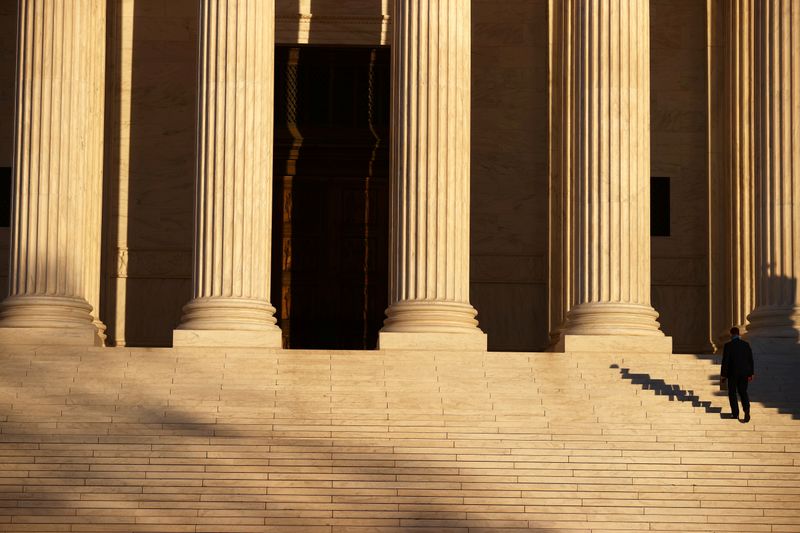By Andrew Chung
(Reuters) - U.S. Supreme Court justices on Monday signaled they may rein in the power of in-house judges serving on a U.S. Patent and Trademark Office tribunal who have the ability to cancel patents in a case involving a dispute between surgical device makers.
Justices raised questions during arguments in the case about the constitutionality of the agency's selection of the judges and grappled over how to address the issue. Their ruling, due by the end of June, could jeopardize the work of a tribunal called the Patent Trial and Appeal Board that adjudicates the validity of hundreds of patents annually.
The case arose from a fight between privately held Florida-based medical device company Arthrex and British-based rival Smith & Nephew (LON:SN) PLC. The justices are considering the U.S. government's appeal of a 2019 lower court decision that the board's judges were appointed in a way that violates a U.S. Constitution provision intended to ensure accountability for powerful government officials.
The tribunal, created by Congress in 2011, is an administrative court run by the patent office. It takes a second look at patents issued by the agency and often cancels them, much to the dismay of some inventors.
Arthrex challenged the constitutionality of the judges after the board in 2018 invalidated part of the company's patent for a surgical device for reattaching soft tissue to bone. Smith & Nephew had requested the review of Arthrex's patent.
At issue is whether the agency's more than 250 patent judges were appointed in violation of the Constitution's so-called appointments clause, which requires certain high government officials - known as "principal officers" - to be named by the president and confirmed by the U.S. Senate.
Other "inferior officers" with lesser authority may be appointed and supervised by department heads, who are themselves named by the president. A president can fire principal officers at will, but patent judges, as members of the civil service, have certain job protections including from unrestricted removal.
Some of the justices on Monday indicated that the level of supervision over patent judges and their decisions seemed insufficient because neither the president nor his subordinates can reverse their decisions.
"These are multimillion, sometimes billion-dollar decisions being made not by someone who's accountable in the usual way that the appointments clause demands," conservative Justice Brett Kavanaugh said.
Conservative Chief Justice John Roberts raised similar concerns but suggested that, because the patent judges are judges, they need more leeway to resolve factual disputes over patents and "you don't want the politically accountable people to have the authority to overturn those." Roberts also said reviewing each of the judges' decisions would be impractical.
Liberal Justice Sonia Sotomayor voiced support for the tribunal's structure, saying principal officers are policymakers, not mere adjudicators like patent judges.
The U.S. Court of Appeals for the Federal Circuit, a specialized patent court, agreed with Arthrex that the tribunal's judicial appointments ran afoul of the appointments clause. But the Federal Circuit said the constitutional defect could be cured by removing job protections, rendering the judges inferior officers.
Arthrex has argued that the Federal Circuit's solution did not fix the problem and that the tribunal's structure remains unconstitutional.

In recent years the tribunal's reviews have become a quick and cheap way for companies that are prime targets for infringement suits, such as such as Apple Inc (NASDAQ:AAPL) and Alphabet (NASDAQ:GOOGL) Inc's Google, to try to invalidate patents. Litigation before the tribunal is seen by many companies as a more efficient alternative to resolving cases in federal court.